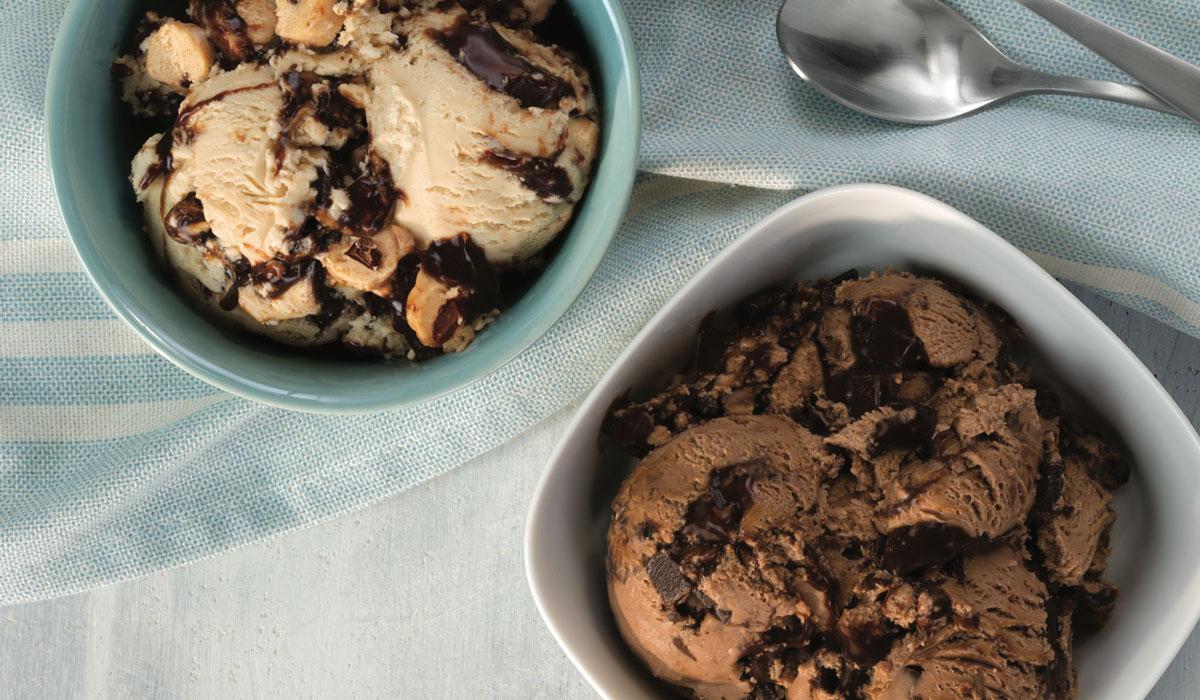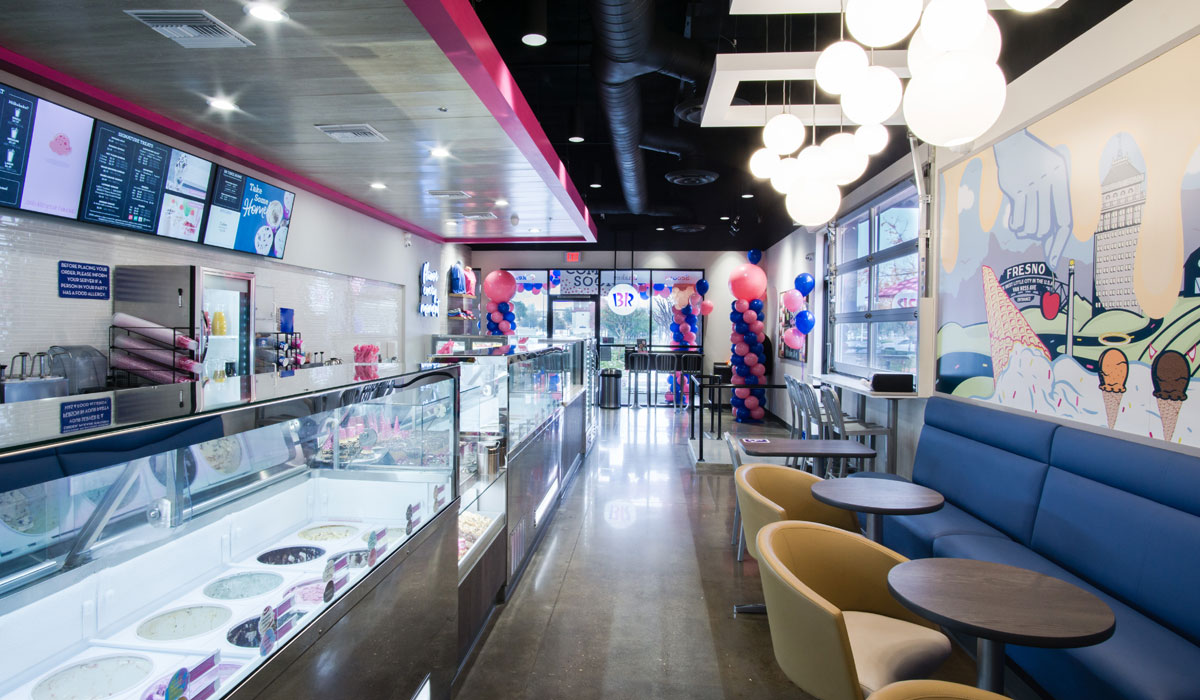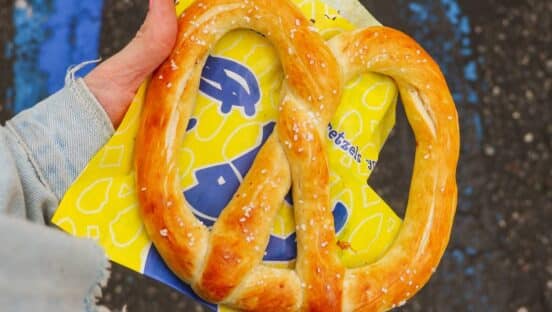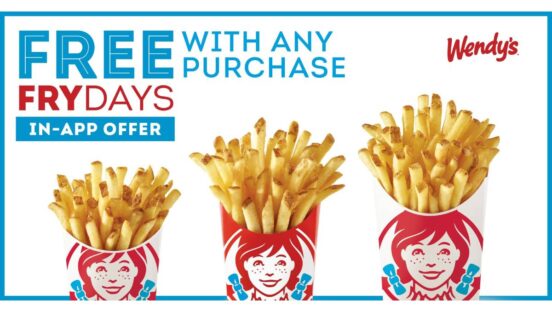When it came to navigating a dessert concept through a global pandemic, two corners of thought confronted Baskin-Robbins president Jason Maceda. One positive and the other a logistical maze. For starters, Baskin’s ability to serve “shortcuts to happiness” when people weren’t sure if they should even leave the house, was a bankable strength. But how do you deliver (literally) a product that melts? Will people consider dessert for an off-premises occasion?
The 2,400-unit chain, brought under the Inspire Brands umbrella last fall in the $11.3 billion Dunkin’ blockbuster, clearly figured it out. Baskin saw its sales reach $2.1 billion globally as same-store comps soared to decade highs. Come summer, the brand was hitting record weekly and monthly increases in average-unit volume and same-store sales growth.
Baskin plans to ramp up, especially now that it’s part of the Inspire’s portfolio (Sonic Drive-In, Arby’s, Buffalo Wild Wings, Dunkin’, Jimmy John’s, and Rusty Taco). It has access to scaled investments, development opportunities, and best practice-sharing it simply never did before.
Plus, the momentum from a year where new offerings and initiatives backed the chain’s unique scale. Product launches like Mangonada to shelter-in-place responses such as DIY Sundae & Polar Pizza kits and an increased focus on delivery, enabled Baskin to spend 2020 responding to a changing world and positioning for the future.
Maceda chatted with QSR about the year, what’s still to come, and why Baskin is more optimistic about its prospects than ever.
Let’s start with 2020. What was is it like for Baskin?
The brand has just been achieving tremendous business results. We went into the pandemic with some of our best quarters, some record quarters. Obviously, once it started I was very concerned but in 2020, we actually had positive comp sales. We were up 3.5 percent. We were only down for about six weeks. It was an amazing story where our brand was resilient throughout, and like I said, positive through it all.
And now coming into 2021, and as the pandemic subsides, we’re posting even stronger results where we’re up over 20 percent year-to-date, 25 percent in Q2. So it’s been incredible. And now with the power of Inspire behind us, I just see them helping us with the momentum to keep that going to accelerate development and innovation. I’m excited about the future.
What are some factors you would credit the momentum to?
First of all, I think one of the reasons for our success during the pandemic is we’ve built up 75 years of brand equity. I think consumers are looking for brands that they trust and we certainly established that. I think there’s a lot of stressors on people right now and what they’re looking for are shortcuts to happiness and that’s what we provide.
One story that I share with all my new franchisees, just to show what they need to focus on in our business and to be guest-centric and guest-focused, is I asked the franchisee who owns our No. 1 store, the highest-volume store in the world, in California—I asked him what his secret to success was. And it was pretty simple: he said, “I hire crew members with the greatest propensity to smile.”
And it really is that simple. It’s just about putting smiles on people’s faces, and that’s what we do at Baskin.
Certainly, we’ve made ourselves more accessible as well. We were at about 1.5 percent of sales with delivery. We’re up to 6 percent. And now we’ve added three carriers—DoorDash, Uber Eats, Postmates. The good news there is the sales seem to be sticking. So even though we increased during the pandemic, as the pandemic subsides and people get out, the delivery sales are still there.
Things like take-home did very well for us, too. Pre-packed quarts and cakes. We’re seeing the pre-packed quart take-home business go down a little bit, but I think we’ve established an incredible cake business. It was strong before but we’ve got a lot of awareness and our cake business is staying there.
Being accessible is key. We have ecommerce where you can buy cakes and get cakes personalized, and pick them up in-store. We’ve made strides in that area. It’s been incredible just to see some of the business sticking. It gets me very excited about the future.

As you know, often times during COVID, a restaurant was the only face-to-face interaction somebody might have had that day. How much did you stress that with employees?
I really put a focus on that well before the COVID pandemic. And I think that’s one of the reasons why we had such great results going in, with record quarters. My message to my franchisees is you can buy ice cream at a lot of different places. You can get it at the gas station. You can get it at the convenience store. It’s really about the experience that we deliver in the Baskin-Robbins to keep the guest coming back. So that is what we’re focused on. It’s what we’re training in our stores with our crew members and it’s certainly working.
How are you handling the current labor challenge facing operators?
We have our challenges, just like everyone else in [quick-service]. But to a lesser extent. First of all, a lot of my stores throughout the country are owned—obviously we’re 100 percent franchised owned—many of my franchisees are true small business owners who own one or two stores. They work in their stores, many of them. That’s been a help. I also think our business model, the fact that we’re selling ice cream and you’re not dealing with grease or cooking things and it’s a fun atmosphere, I think that’s lessened the pressure on hiring and we’ve been doing fairly well. And not as many people are required in our stores. So it’s a challenge, but I think to a much lesser extent than what we’re seeing in other brands.
Talk about some of the brand’s menu innovations and how they’ve resonated?
We’re famous for our flavors. So we continue to focus on flavor innovation. But we’re also looking at making sure that we’re attractive to all of our guests from a diverse portfolio. One of our most successful product launches ever was earlier this year in the Mangonada, which is an authentic frozen Mexican beverage. It’s done incredibly well. It was going to be an LTO. We decided to extend that, and we might actually make it a permanent product. Flavors like that transcend ages and different types of folks.
We have some new non-dairy flavors made with oat milk as well. They’re just incredible. We’re seeing new faces in our stores. When I go on social media I see people thanking us. People who can’t have dairy. And to be honest with you, I have a sweet tooth, but I try those products and they taste amazing. They taste just like ice cream. The one we just rolled out is a non-dairy salted fudge bar.
We’re focused on building beverages. What we see is higher frequency from our guests. So we might have guests who come in once or twice a month for our ice cream, but when they’re attracted to the beverages they’re frequency goes up. We certainly do that with the Mangonada and our Cappuccino Blast drinks, and all of our shakes.
We try to keep it exciting. Right now, we have a Creatures Creations promotion, which is geared more toward kids. We’re trying to reach young, old, and everyone alike. It’s been a huge success and has created a lot of excitement on social media.
To tell one story, I had a mom reach out to me. Sometimes we get fan mail, which is one of my favorite things about this job. I had a mom from California reach out to me when we discontinued our Chocolate Extreme non-dairy, which was about a year and a half ago. She said her son can’t eat dairy. It was his favorite thing and it’s no longer available. Is there anything I can do to help? I told her about the non-dairy salted fudge bar and sent her some. I could read in her email the emotions that she had and the feelings that she had at the fact that we could make her son happy. It’s just one of those benefits of having a job in the ice cream industry. I can put smiles on people’s faces.
What was it like getting ice cream to travel?
We got some complaints early, as you could imagine any time you get into a new aspect of the business. But they’ve been relatively low all things considered. The partners that we work with have been great and have addressed the issues immediately when we bring them to their attention. And so far, our guests are enjoying it. We have modified some of the bags and things like that. A lot of people are ordering shakes. I’m surprised to see people still order sundaes and scoops of ice cream. We’ll put the cone inside so the ice cream is not on the cone. But we haven’t had a lot of issues. We’ve had a lot of positive guest reactions.
How has the Inspire connection helped?
Being part of Inspire Brands now is going to help us continue the momentum and accelerate growth. As a standalone brand, Baskin-Robbins wouldn’t have access to some of the resources, the data, the insights, best practice sharing, supply chain leverage and synergies. We just wouldn’t have that as a standalone brand, or even when we were part of Dunkin’ Brands. The future is bright considering that we have access to that through Inspire. And one of the exciting things to me on the development front is there’s a lot of great franchisees within the Inspire Brands’ family and some of these franchisees are looking to grow. Sometimes the trade areas they’re in, there’s no more room for their primary brand. So they have two choices—to grow outside of their primary area, which isn’t always comfortable with them. They don’t have the same context, connections, and lay of the land. And the other alternative is to do it with other brands.
We’re already seeing some franchisees from other brands that are interested. Might be an Arby’s franchisee that does Baskin-Robbins and vice versa. We’re seeing some synergies there, and I think it’s going to help with the development of all of the Inspire brands. In the first month after we were acquired, we consolidated the media buying between all of the Inspire brands and we were able to save a significant amount on our media purchases at Baskin-Robbins. And instead of saving that money or putting it back into the ad fund, we invested in incremental media. It began to show benefits immediately. So some great news there.
Is this climate ripe for growth?
I do think the current environment has created a lot of opportunities. We are seeing some excitement from our existing franchisees and getting more new franchisees than we’ve ever seen before. The brand is also investing alongside our franchisees. So we have some incredible development incentives, where we’re providing cash or royalty incentives to our franchisees. We’ve actually seen an uptick in signings and letters of intent. It is a great atmosphere. The other thing, and what I feel is the most important part of franchising and most important part of the story, is franchisee unit-level economics at the store level. We’ve seen, along with all the success over the past couple of years in sales, significant increases in the unit-level economics of our stores. That’s certainly going to help when we’re out looking for new franchisees.
One thing that’s amazing is I get a lot of new franchisees out of our stores. General managers, store managers that have decided they want to get into the business. And what a better testament to the brand than someone who has worked there for five or 10 years as an employee that’s coming out and either buying the story that they worked out or building new stores? We’ve had a significant amount of those over the last couple of years as well.







